Two by Two
A couple blends their cultural values across two countries, at two jobs, and with two sets of twins.
Two by Two
A couple blends their cultural values across two countries, at two jobs, and with two sets of twins.
Kabedi Mutamba | Director of Visuals/Co-Lead Director of Photography
Charice Salazar | Director/Co-Lead Director of Photography
Charice Salazar | Director/Co-Lead Director of Photography
“Lift your burden onto your knee,
we will help you put it on your head,”
we will help you put it on your head,”
Lydie Sato said, citing an African proverb. The proverb refers to how Africans rely on their communities to get them through their day and help carry their burdens. In America, neighbors tend to keep to themselves. “I could die in my bedroom, and it would be days before they find me. We hear about it all the time,” Wazy Sato said.
Wazy and his wife Lydie are a couple navigating two cultures. They do so with two jobs and two sets of twins: Eliakim and Eliezer, eight-year-old boys born in Togo, and Nathan and Eliana, a boy and a girl, both three-years-old and born in the U.S.
Wazy and his wife Lydie are a couple navigating two cultures. They do so with two jobs and two sets of twins: Eliakim and Eliezer, eight-year-old boys born in Togo, and Nathan and Eliana, a boy and a girl, both three-years-old and born in the U.S.

If they were raising the kids back in Togo, Wazy and Lydie would have their mothers and other trusted family and friends to help take care of their kids and teach them about their roots.
Although Wazy and Lydie have found support and a familiar community in their church, the challenge of raising their kids in the U.S. still rests mostly on their shoulders. Away from family, away from their mother tongues, away from their original home, they turn to their faith for strength as they raise their four children in Cedar Rapids, Iowa.
Although Wazy and Lydie have found support and a familiar community in their church, the challenge of raising their kids in the U.S. still rests mostly on their shoulders. Away from family, away from their mother tongues, away from their original home, they turn to their faith for strength as they raise their four children in Cedar Rapids, Iowa.


Wazy and Lydie want to give back to the church community that took them in when they first came to America. They are helping their church and the African diaspora preserve a sustainable version of African culture that they plan to pass on to their children.
Caretaker by day and one-man production team by night, Wazy comes home on Monday night to help Lydie film videos for their Facebook, TikTok, and YouTube Channel, WellnessHouse TV.
Caretaker by day and one-man production team by night, Wazy comes home on Monday night to help Lydie film videos for their Facebook, TikTok, and YouTube Channel, WellnessHouse TV.

Wazy obtained a biology degree in Togo, and he uses his knowledge of body systems and nutrition to support his wife in creating content.
Lydie completed several wellness courses to learn how to eat a balanced meal of vegetables, fruit, adequate protein, and healthy grains. As her diet changed, so did her family’s. She still serves them authentic African food, but with healthier ingredients and portions.
Wazy and Lydie were invited to speak about their wellness journey at their church’s women’s conference in October 2024. Several members of the congregation asked where they could find more information about wellness in an African context. Thus, WellnessHouse TV was born two months later.
Lydie completed several wellness courses to learn how to eat a balanced meal of vegetables, fruit, adequate protein, and healthy grains. As her diet changed, so did her family’s. She still serves them authentic African food, but with healthier ingredients and portions.
Wazy and Lydie were invited to speak about their wellness journey at their church’s women’s conference in October 2024. Several members of the congregation asked where they could find more information about wellness in an African context. Thus, WellnessHouse TV was born two months later.
“I know where I come from.
I know what I ate, and I know what I learned,” Lydie said.
I know what I ate, and I know what I learned,” Lydie said.

Lydie is trying to make sure her children eat healthy in a country where fast and fried foods are a go-to. She cannot control what her children eat at school, so they do get to try some of those greasy foods. Still, Lydie makes sure they understand the consequences of eating unhealthy food. “I cannot force them. Everyone has their own choice. I know that they’re still young and do not understand it yet, but with time, they will learn the importance of eating healthy and eating balanced,” Lydie said.




51,792 people obtained permanent resident status via diversity visa in 2017. Out the 1,127,167 total people who obtained permanent resident status in 2017, 1,597 people were from Togo
Data from U.S. Department
of Homeland Security
Data from U.S. Department
of Homeland Security
Immigrating to the U.S. was not always the goal for Lydie. When her father, a pastor, foretold that his grandchildren would grow up in “the white man’s country,” Wazy readily acknowledged it with an “Amen” while Lydie and others laughed skeptically. How would her children grow up in “the white man’s country” if she was here in Togo?
Her father’s prophecy became a reality when she was approved for a green card in 2016. She forgot she had entered the diversity visa lottery a year prior, complying on a whim to a stranger’s offer.
The most important task on her mind was her upcoming wedding to Wazy. The couple has known each other since they were young, growing up around the same church. “She was my first love,” Wazy confessed. Lydie was not quite convinced, and they separated for some time while pursuing their individual educations, but found each other again in adulthood.
It was Wazy who decided she would take the final step and immigrate to the U.S. Lydie boarded a flight in August 2017, just three months after giving birth to their twin boys.
Wazy and their boys joined Lydie in Cedar Rapids three years later in 2021, after delays caused by COVID-19. Wazy and Lydie are celebrating their ninth wedding anniversary this summer and the one-year anniversary of WellnessHouse TV in December.
Her father’s prophecy became a reality when she was approved for a green card in 2016. She forgot she had entered the diversity visa lottery a year prior, complying on a whim to a stranger’s offer.
The most important task on her mind was her upcoming wedding to Wazy. The couple has known each other since they were young, growing up around the same church. “She was my first love,” Wazy confessed. Lydie was not quite convinced, and they separated for some time while pursuing their individual educations, but found each other again in adulthood.
It was Wazy who decided she would take the final step and immigrate to the U.S. Lydie boarded a flight in August 2017, just three months after giving birth to their twin boys.
Wazy and their boys joined Lydie in Cedar Rapids three years later in 2021, after delays caused by COVID-19. Wazy and Lydie are celebrating their ninth wedding anniversary this summer and the one-year anniversary of WellnessHouse TV in December.
Explore THeir Journey
Lydie recieves her visa.
July 2017
Wazy and Lydie lead a wellness panel at their church's women's conference.
Oct. 26, 2024
March 16, 2022
Eliana and Nathan are born.
March 5, 2021
Wazy and the twins arrive in America.
March 20, 2020
The U.S. Department of State halts all routine visa services at all U.S. embassies and consulates. Wazy and the twins are unable to move forward with the immigration process.
Aug. 1, 2019
Lydie goes back to Togo to visit her husband and kids.
Wazy and Lydie's religious wedding
Aug. 7, 2016
Wazy and Lydie's traditional wedding
July 9, 2016
WellnessHouse TV debuts on YouTube.
Dec. 19, 2024
Oct. 20, 2023
Lydie becomes a U.S. citizen.
March 7, 2021
The Sato family attends church together in the United States for the first time.
Feb. 8, 2021
Wazy and the twins' papers are approved.
March 11, 2020
The World Health Organization declares COVID-19 a global pandemic.
Aug. 31, 2017
Lydie recieves her Green Card.
September 2017
Lydie applies for visas for Wazy and the twins.
Lydie leaves for the United States.
Aug. 9, 2017
Eliakim and Eliezer are born.
April 26, 2017
Aug. 6, 2016
Wazy and Lydie's civil wedding.
Wazy and Lydie reunite.
Dec. 11, 2015
Lydie's visa application is accepted.
May 2016
Lydie enters the Visa/Green Card lottery.
May 2015
Wazy and Lydie split up.
September 2008
Wazy and Lydie meet for the first time as children.
Aug. 7, 1994

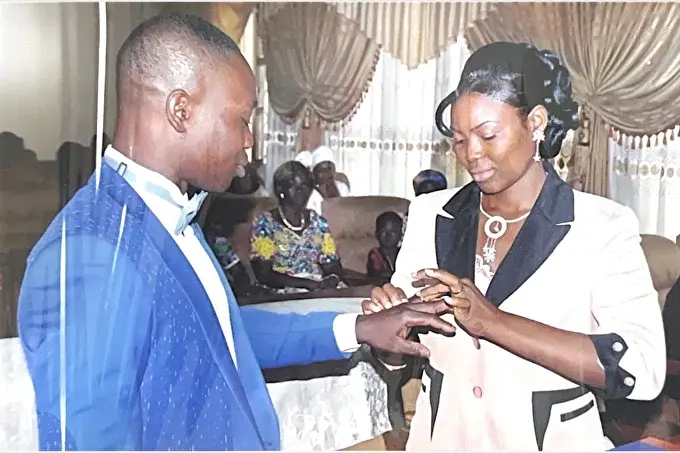

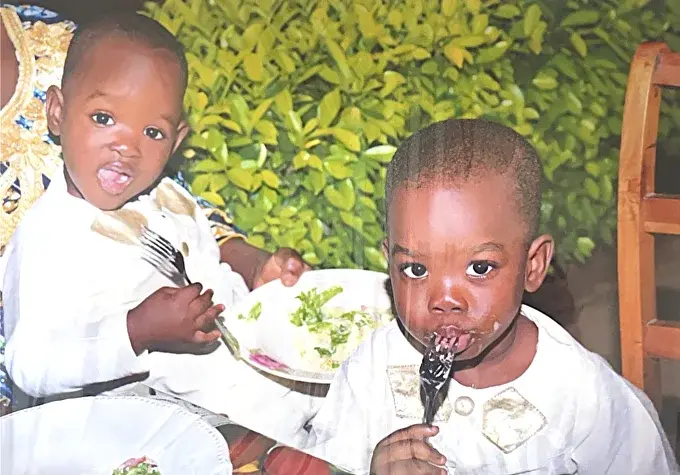
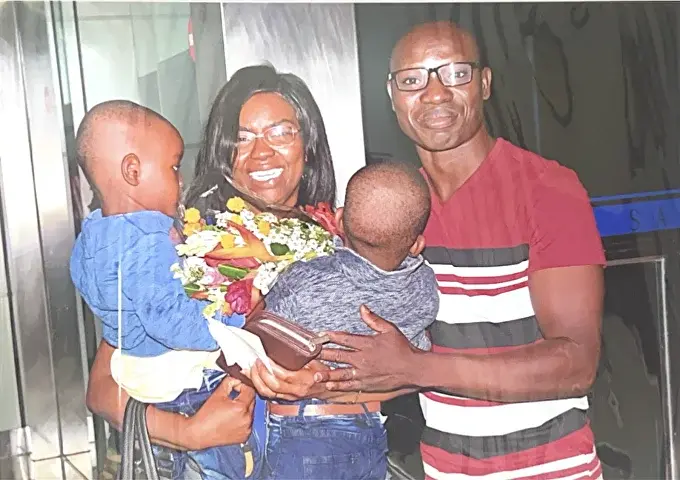
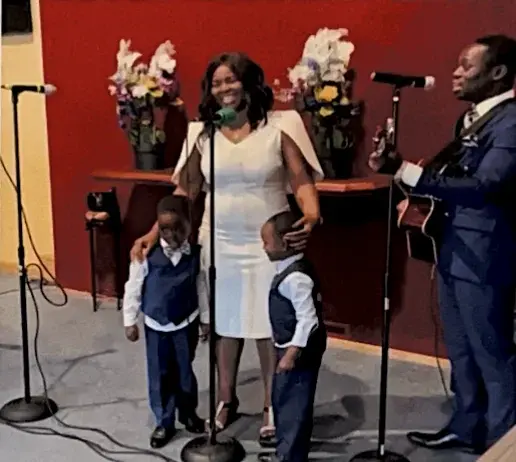
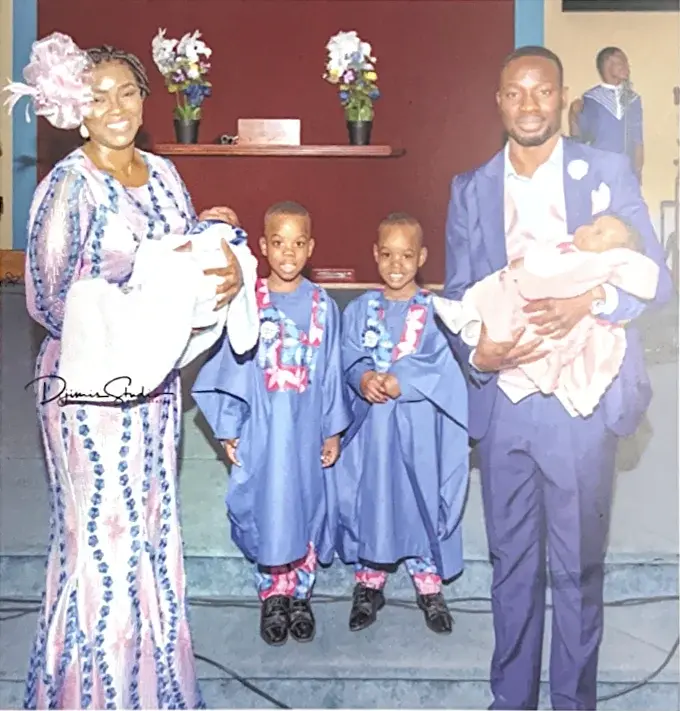


Wazy lives to be helpful; it is in his name. In Kabiyé, his vernacular language from Togo, Wazy translates to ‘be useful’. He has several passions rooted in two objectives: helping people and learning new things.
During Sunday service at his church, Wazy moves between playing piano, drums, guitar, and bass. He runs the church’s livestream. He mans the sound desk. He tailors clothes for his family and other families at his church. He repairs computers, phones, and tablets. He films for WellnessHouse TV using a professional video camera, lights, and editing software. He builds garden beds. He cuts his three boys’ hair. He performs basic maintenance on his car. Wazy understands that his talent is unique, but he insisted it is his duty.
During Sunday service at his church, Wazy moves between playing piano, drums, guitar, and bass. He runs the church’s livestream. He mans the sound desk. He tailors clothes for his family and other families at his church. He repairs computers, phones, and tablets. He films for WellnessHouse TV using a professional video camera, lights, and editing software. He builds garden beds. He cuts his three boys’ hair. He performs basic maintenance on his car. Wazy understands that his talent is unique, but he insisted it is his duty.
“When it comes to my family, I do not get tired.
Everything I can do to make my wife happy,
everything I can do so that my children
are joyous and fulfilled, I do it," Wazy exclaimed.
Everything I can do to make my wife happy,
everything I can do so that my children
are joyous and fulfilled, I do it," Wazy exclaimed.

Wazy’s two eldest sons, well aware of their dad’s efforts, circle him and pick up tasks in the yard where he left off. Wazy’s reputation runs deep in his community, but it finds its most important roots at home. “Daddy can fix everything. That’s what they will say,” Wazy said proudly.
Indoors, the children also imitate their mom, asking to help cook and rehearsing her staple intro: “Welcome to WellnessHouse TV.” The parents hope to be role models for their children to look up to, passing on not only their healthy lifestyle but also their Christian and African values.
Indoors, the children also imitate their mom, asking to help cook and rehearsing her staple intro: “Welcome to WellnessHouse TV.” The parents hope to be role models for their children to look up to, passing on not only their healthy lifestyle but also their Christian and African values.



When it comes to parenting, Wazy and Lydie have found their rhythm. Lydie took up work at a nearby factory when she first arrived in the U.S. in 2017. Wazy joined her at the same factory just 20 days after he arrived in 2021.
After the birth of their youngest twins, they decided they wanted to dedicate more time to raising their children and left their jobs in the factory to begin working as caretakers. In Africa, Wazy said, people do not take their children to babysitters. Family members or close friends are usually the ones who take care of children when the parents cannot.
After the birth of their youngest twins, they decided they wanted to dedicate more time to raising their children and left their jobs in the factory to begin working as caretakers. In Africa, Wazy said, people do not take their children to babysitters. Family members or close friends are usually the ones who take care of children when the parents cannot.
“You have to teach your children your values yourself,” Wazy insisted.

Since the Sato children are growing up influenced by American culture, Wazy and Lydie have to find the balance between letting their kids experience the world for themselves and maintaining their foundation in Christian and African morals. “The Bible says that children should obey their parents. So, a kid who obeys their parents, the Bible says that kid will be happy and will live a long life on Earth,” Wazy explained.
Wazy teaches his children tolerance and acceptance of everyone while emphasizing that in their household, they do things differently. No ripped jeans. No tattoos. No dreads. No taper fades. No boyfriends and girlfriends. No inside-out clothing. Being well-dressed and put together is something very important for Wazy, and he wants to ensure that his children understand why it is important.
Dressing well goes beyond church on Sundays. At Eliakim and Eliezer’s spirit week at school, they got to dress like a teacher for the day. Wazy put them in suits, earning the approval of their school principal, who took a photo with them. Other spirit days included silly hair day and inside-out clothing day; the boys did not participate. “Our children need to grow up free. We’re not trying to force anything on them, but we make sure they understand that such and such is good and such and such is bad,” Wazy said.
Wazy teaches his children tolerance and acceptance of everyone while emphasizing that in their household, they do things differently. No ripped jeans. No tattoos. No dreads. No taper fades. No boyfriends and girlfriends. No inside-out clothing. Being well-dressed and put together is something very important for Wazy, and he wants to ensure that his children understand why it is important.
Dressing well goes beyond church on Sundays. At Eliakim and Eliezer’s spirit week at school, they got to dress like a teacher for the day. Wazy put them in suits, earning the approval of their school principal, who took a photo with them. Other spirit days included silly hair day and inside-out clothing day; the boys did not participate. “Our children need to grow up free. We’re not trying to force anything on them, but we make sure they understand that such and such is good and such and such is bad,” Wazy said.


As time passes and their children continue to grow up, it has become evident that some of their roots flown over from Togo are not going to hold. Wazy and Lydie grew up speaking French, Kabiyé, Lamba, and Ewe. Wazy also learned Kotokoli.
Their eldest sons were born in Togo and spoke French nearly exclusively before they started school in America. Now they, and their two younger siblings, can only understand French, but do not speak it. Despite this, Wazy and Lydie are not discouraged.
The fact that their children speak primarily English is helping them learn how to speak it. Their plan for their children is to first master English in school and come back when they are ready to learn French to communicate with their relatives in Togo.
With a blend of Africa and America in their home, the Sato family uses multiculturalism to their advantage. Their wellness channel not only educates Africans, but also offers the world a glimpse into their culture and language.
The Sato kids are young, which means that Wazy and Lydie have many more lessons and conversations about values and culture to navigate. Still, the community they have built through their church is always there to lend an extra hand. The Satos now hope to give back as much as they have received.
Their eldest sons were born in Togo and spoke French nearly exclusively before they started school in America. Now they, and their two younger siblings, can only understand French, but do not speak it. Despite this, Wazy and Lydie are not discouraged.
The fact that their children speak primarily English is helping them learn how to speak it. Their plan for their children is to first master English in school and come back when they are ready to learn French to communicate with their relatives in Togo.
With a blend of Africa and America in their home, the Sato family uses multiculturalism to their advantage. Their wellness channel not only educates Africans, but also offers the world a glimpse into their culture and language.
The Sato kids are young, which means that Wazy and Lydie have many more lessons and conversations about values and culture to navigate. Still, the community they have built through their church is always there to lend an extra hand. The Satos now hope to give back as much as they have received.

READ MORE FROM ISLE


